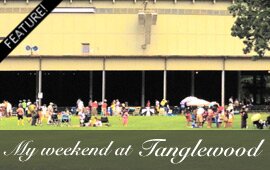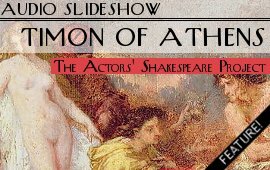
IFfringe company Whistler in the Dark has a reputation for one thing, it’s taking on tough material and making it work with limited resources. For their current show, the Tom Stoppard double header , the Whistlers have moved from their usual digs at the Factory Theatre to the BCA’s Black Box, settling in nicely for this production that makes use of little in the way of sets or lights. Whistler regular Jen O’Connor lights much of Cahoot’s Macbeth herself with floor lamps! If you find yourself at the Factory Theatre much, you’ll know that this group has a lot of experience working together, and the strength of the ensemble shows, as they teach each other Stoppard’s imaginary and vaguely British language Dogg, or run around on rackety risers during a genuinely scary abridged version of Macbeth (before it’s interrupted by a secret police officer).
It’s refreshing to see theater that operates and is accessible on so many levels. As the characters of Dogg’s Hamlet work together to assemble some kind of commencement stage out of “planks, slabs, blocks, and cubes,” the play essays how language is learned (here, by the play’s school kids and the audience much faster than the persnickety headmaster played by the always dynamic Scott Sweatt). Or, how different parties may appear to be speaking the same language, when in fact each ascribes a different meaning to the words he is speaking.
This whole scenario comes from a thought experiment posed by Wittgenstein, where a worker building a platform calls out to a co-worker to pass him the individual components of the platform; “plank,” “slab,” etc. (The Whistlers have gone so far as to make them actual building blocks.) Wittgenstein hypothesizes that the platform could be built even if the worker and co-worker each had their own definitions for “plank,” “slab,” and so on. One might understand “plank” as a board and the other as the word for “next piece, please.” Heavy stuff yes, but there’s also an absolutely riotous abridged version of Hamlet, performed by the play’s schoolchildren who, being from some nonsense land that speaks Dogg, are doing Hamlet as some kind of ESL exercise. Our Hamlet, Aimee Rose, is pretty good with a slow-mo sword.
Shakespeare sped up and reduced to slapstick is always funny and the fact that it is ties right into Stoppard’s heady semantic subject matter. At one point in Cahoot’s Macbeth “Easy” (Mac Young) appears, reprising his role as a white glove deliveryman from Dogg’s Hamlet and speaking his Cockney Mad Libs dialect of Dogg. The Macbeth players begin to speak to him in quotations from the text, causing our poor “Easy” even more confusion.
I’m really not qualified to dig into Wittgenstein beyond what I read on Wikipedia, but as two of Shakespeare’s most canonical works are condensed and performed as plays-within-plays by characters who are, at least in the case of Dogg’s Hamlet speaking lines whose literal meanings they do not understand (though phonetically, Dogg is the same as English), one considers how this relates to how an English-speaking audience or cast understand Shakespeare’s language and how dependent we are on already knowing what comes next; plank, block, ghost, murder of Polonius, fatal duel. And as much as language is a force of miscommunication here, it later becomes a mode of subversion, as the players in Cahoot’s Macbeth defeat a secret policeman (commandingly played by Nate Gund) by picking up Easy’s language.

Aimee Rose Ranger and Scott Sweatt in 'Dogg's Hamlet'
Whistler in the Dark’s runs at the BCA Black Box through November 19th along with Imaginary Beast’s . Tickets $10 students, $20 everyone else at .



